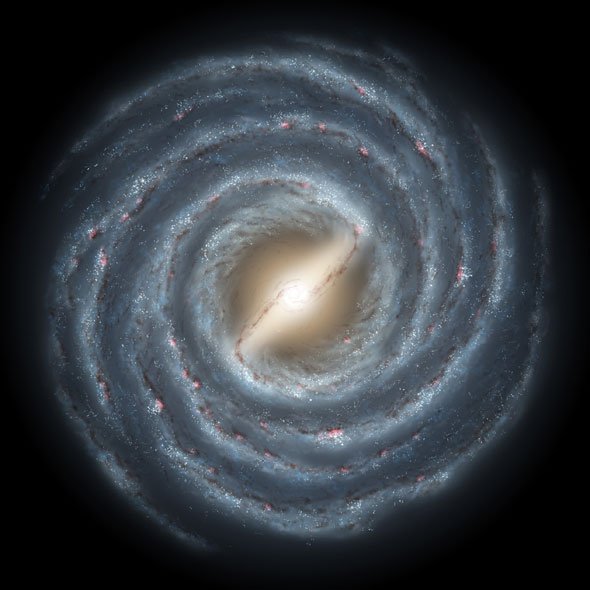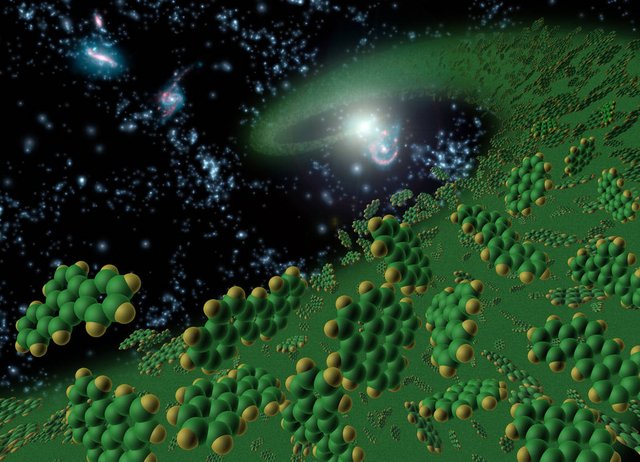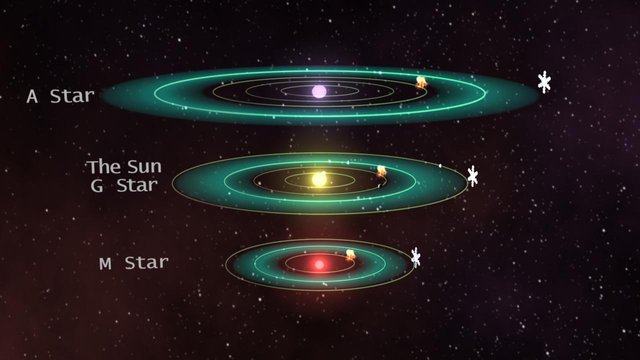Life on other planets, how likely are they compared to the chance I finish this post?
how common life is throughout the cosmos is defined by only a few factors that all fit into one equation, the drake equation

( source)
The drake equation shows how many civilizations would exist within our galaxy
This can be as many as a billion or as small as 0.001 at once. We could be a small blip above the average or we could be a zoo for the amusement of a million civilizations.

( source)
(pic by Mohammad Alrohmany)
Each part references a critical aspect of the chance of life
N is the amount of possible civilizations that are close enough that our light could reach them (and theirs us).
Our light cone is extremely small and only a few stars are covered, we can pretend we can interact throughout the galaxy instead.
R* is the average rate of star formation in the galaxy.
Well that is at .68 to 1.45 stars a year. (or about 2-3 stellar masses total)
The next is how many stars have planets. which is about 75%.
The next is how many stars are there per system with a planet. Which is over one but detecting planets is hard and we do not know for sure.
The next is how many planets will develop life. Take your best guess. How about one in a hundred thousand? I really don't care what you pick we have no clue.
The next is how many produce intelligent life. Take a wild guess. I like the number twelve so how about one in 12 hundred? That sound good? Nice.
Next is how many will be able to communicate. I also like the number 32 so how about one in 32? Communication can help survival so it should be high.
The last is how long will the civilizations last. How about a million years? Maybe they only last a few thousand. I have never seen the end of a civilization. Tell me, how long do you think humanity will last?

( source)
We do not know most of the values because we don't understand life
We know very little about life. We have only found one set of it that lives in very limited situations. All life on earth came from a single species. We have nothing to compare ourselves to.
The only thing that would most likely link us is carbon. Carbon is a reactive element that can form long chains of itself. stay stable for long periods of time but also break easily enough when needed. This means mutations can occur which means it can easily evolve, but they won't happen too often. Other elements like silicon could form close to the same bonds but they would be a lot harder to break which would mean it would take a lot of energy to do anything with its body. Carbon is also far more common and that makes it more likely to be used.
What would life look like if we found it?
Well we can only guess. It must be able to reproduce by our rules of what life is. It could live like a hive and only parts reproduce or it could live like an animal and each ones goal is to reproduce. This means it needs a way to reproduce. It must have a way to move food and energy around within itself to be able to do this. (For example a virus relies on a cell of other life so most people don't consider it alive.) It needs some sort of fluid it is able to control to a degree. (Maybe a vacuum with a wall around it could work?) It needs to have a form of energy to be able to reproduce. This means it must evolve somewhere where energy is plentiful. This could be on dust clouds, planets, or even inside stars. Life only needs a few conditions to exist, being lucky is one of them.

( source)
We need to just keep looking and hope we find it. The universe is most likely infinite so life will exist somewhere. Near us? We can't tell. There are over 40 billion planets. If the chance of life is less than one in 40 billion we are most likely alone. If the chance of life is higher....
Life like us
"like us" is a very general term. In my opinion life would need to be able to touch and see to be considered like us. If it can not feel the environment around it and can not "read" the electromagnetic spectrum like us it is not very similar. Other life will almost certainly read the electromagnetic spectrum differently. For example they may have openings in the body that are black and heat up when more light hits them. This could tell them a lot about light in all energies by different ones heating up different amounts.
The point of this
The point of this is to show life could have any possible configuration that you could imagine. Anything is a possibility. Life just needs to be able to reproduce on its own and respond to the environment in some way. They could be slow, fast, live a million years or live a few seconds, they could fight or work together, live in space, a planet or in a star.
Where we would be most likely to find life?
Life might be more common in stars considering, the billions of stars and how many million times they are more massive than planets. They make up so much more of the universe they must have a higher chance of producing life? Maybe but we would be hard pressed to find it.
We need an object we can easily search.
A planet around a star could host life and it would be easier to examine. It would need a few things to host life. A common fluid is the most important. This means it must exist within a certain distance from the star. This is called the "goldilocks zone".

( source)
This area is where water would stay liquid. Water is fairly common throughout the universe so we can assume life is more likely to exist with water. This means we must look for planets within this zone if we want to find it quickly. Life also needs an energy source. This is the most open ended one. Life on earth gets energy in many different ways. Some from sunlight, some from radioactive elements, more from natural chemicals they find around. Sunlight is common in the universe and causes things to live near the surface. This again will make it easier to find. If a planet is too big the higher gravity will mean it will take more energy to move. This higher energy requirement means if life does evolve it will be extremely slow and harder to find. If it was too small parts will leak away over time (just look at mars) this will mean life will not last as long.
We are looking for planets within the goldilocks zone, with lots of water, with enough sunlight and not too small or big.
Good thing we have found planets like that
We have found many planets that are earth-like and many that could support life. Venus for example could support life in the upper atmosphere (in fact we could build flying cities but that's another post). We have found many earth-like planets sadly many of them are too hot. This is because of how we detect planets. We watch stars and try to see if it dims from a large object passing it. The farther away it is the less likely we are to notice it. This means that unless we find another way to find planets we will only find ones that are close.
Now lets look at the chance I finish this post
Well things look good right now. I'm almost done. Tags are in title is done, will ed1t soon. The real question is will I actually ediit it or will I just hope I made no mistakes....
I would put it at one in four I don't forget to hit post.
Edit: I actually did forget
My next posts will be on where we could live in the solar system.
Give me more ideas about to write about in comments and tell me how I did on this one.
If you enjoyed subscribe, if not why are you still here.
BTW. @anarchyhasnogods, what do you think about UFO? What's this? In your opinion, of course.
The alien ones are fake
Ok. But a lot of photos and videos showing UFO. Do you thing this is a fake?
I was always interested in this subects. Waiting for your next article, sound interesting. I can not say where would I like to live except Earth ))
Intersting article. Since we have more advanced and sophiscated technology, it's a matter of time before life is discovered on other planets.